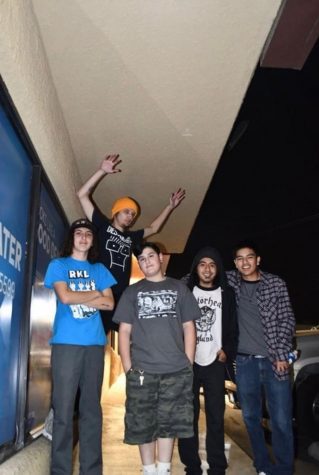The Grass is not Always Greener on the Other Side
Some Mexicans share their views on the current insecurity of their country
April 21, 2015
“You cannot go out wherever you want freely or act normal all the time. You have to appear more as if you were lost most of the time. Neither can you act extravagant or anything like that. You always have to appear humble…so you don’t attract the hunter’s attention,” said twenty-two year-old Jose Luis Orozco, who hails from Tangancicuaro, Michoacan, Mexico.
Orozco said that the constantly growing insecurity in his country affects his daily life approximately “sixty percent of the time. You might work hard to have something in life, but then if [the criminal groups] see that you are being successful or that you are doing well economically, you have higher probabilities of being kidnapped, robbed, or injured.”
Born in Rosales, Chihuahua, eighty-two year-old resident of Oxnard, California, Jose Pando, said residents in Mexico are constantly feeling insecure. “Some even fear going to work or going out with their family.”
Citlali Rosales, a seventeen year-old senior at her local high school, Preparatoria por Cooperación Tangancicuaro, in Tangancicuaro, Michoacan, said that insecurity in her area affects everyone. “Fear and distrust are constantly around — as a result there are secondary factors, such as the prohibition of going out in the afternoons or at night. Also, the always present anxiety of not knowing whether your family and friends are safe and well.”
“I consider the level of insecurity that exists in my country today as high. I feel safe to some extent because I have an honest way of living. However, I know I am not exempt from the consequences that the insecurity in my country brings upon its citizens. Likewise, I believe that we do not count with any protection from the government. That is what I am afraid of — if I ever become a victim of organized crime, those who should protect me will fail,” said attorney Ana Lucia Ayala, who resides in Zamora, Michoacan.
Orozco said that the reason why insecurity in Mexico became such an immense problem was because of “the corruption of the principal leaders of the government. They were corrupted by racketeering and their ambition kept them from protecting people, so they corrupted themselves and allowed cartels to work.”
However, Ayala said that the most important factors that made Mexico’s insecurity such an aggravating problem were the lack of education — which makes people more vulnerable to crime — poverty, unemployment, impunity, and the vicious government we have, which shamelessly fills its pockets with the people’s money impoverishing the country.”
Professional soccer goalkeeper Rodrigo Gutierrez of Club America said, “In twenty years I see Mexico with [many] social differences. The wealthy people [are] becoming wealthier and the poor [are] becoming even poorer.”
Some people foresee a civil war in which the Mexican people will fight for their human rights, others think it is already happening, and some doubt a war is in Mexico’s future.
“If the current system to fight against corruption is not changed and if impunity keeps going on, I think we will have an even more dramatic scenario, [and] maybe even armed uprisings from the people who are tired of living in misery and being stepped on,” said Ayala.
Orozco said that in Michoacan “the war began last year. The government is supposed to be there to defend its citizens but they are doing the opposite…Therefore, there will be a moment in which the citizens will have to defend themselves.”
Oxnard High School students were polled about what may happen to Mexico in the future, and their answers varied. When asked if they thought insecurity in Mexico would decrease with time, 29 percent said yes and 71 percent said no. Also, when asked if they thought Mexico might be heading to a civil war, 52 percent said yes and 48 percent said no.


